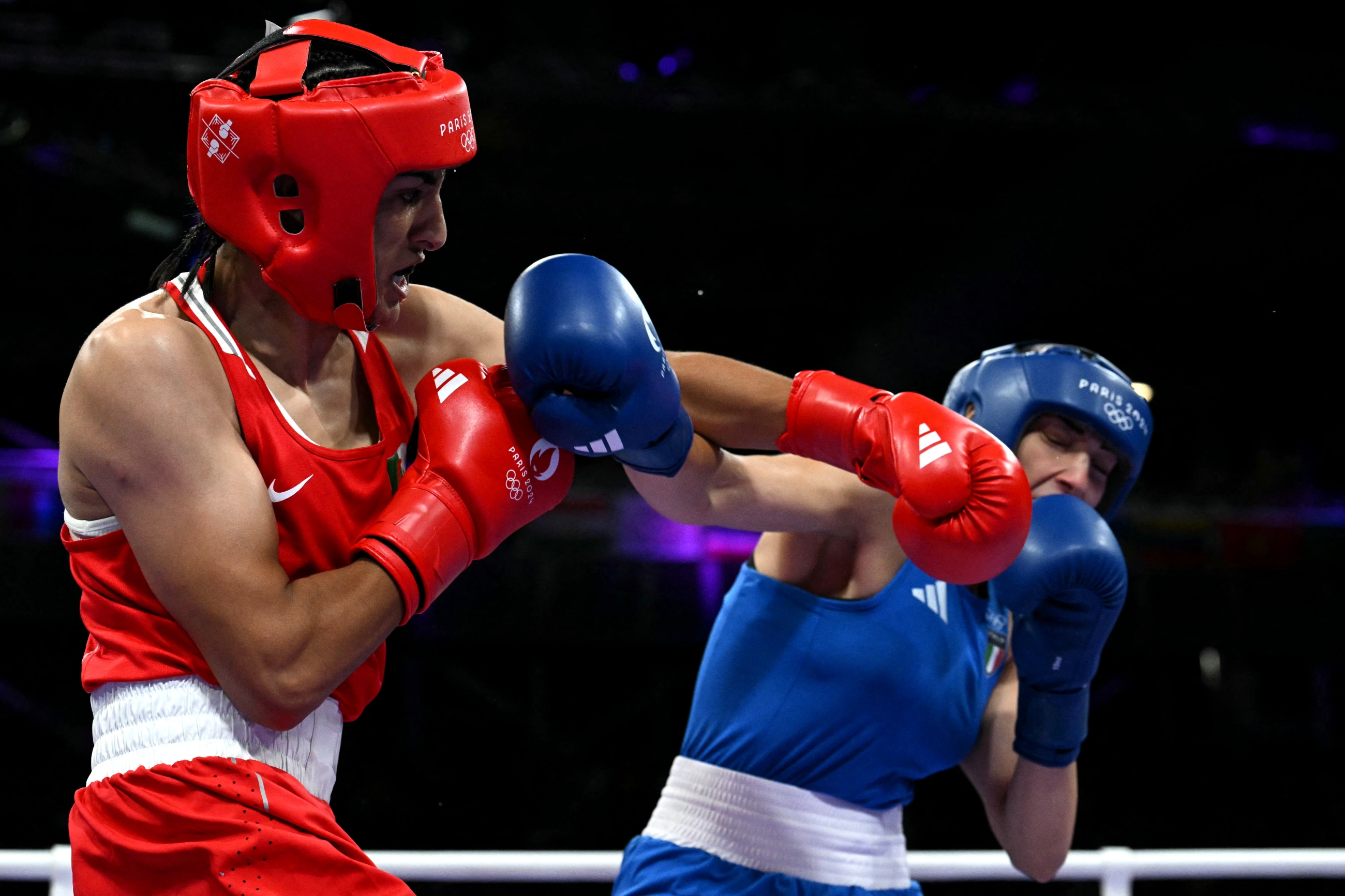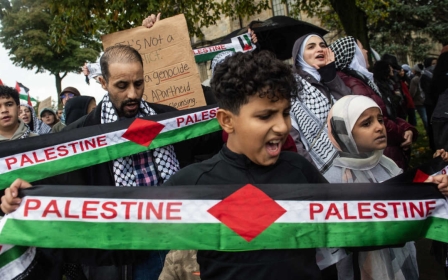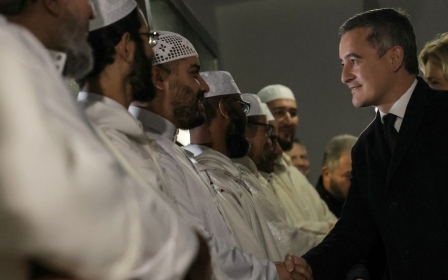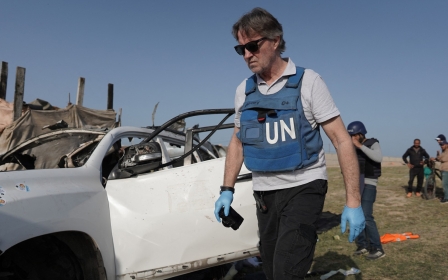'Pure bigotry': Social media users defend Algerian boxer Imane Khelif against online abuse

Several social media users have criticised what they described as racist and bigoted abuse directed at Algerian lightweight boxer Imane Khelif, after her decisive win over Italian opponent Angela Carini at the 2024 Paris Olympics triggered a wave of complaints about her being allowed to compete.
Khelif, 25, known for her strong track record in women's boxing, secured victory in just 46 seconds after throwing multiple punches at Carini at the North Paris Arena on Thursday, forcing her to walk away to her corner and abandon the fight - an extremely rare scene in Olympic boxing.
After Khelif was declared the winner, Carini was heard muttering: "It's not right." She refused to shake Khelif's hand before bursting into tears.
"I felt a severe pain in my nose, and with the maturity of a boxer, I said ‘enough’ because I didn’t want to. I didn’t want to. I couldn't finish the match," Carini said.
Within seconds of being declared the winner, prominent social media figures began attacking Khelif with accusations that she was "biologically male". Just 24 hours earlier, Algeria's Olympic Committee had condemned "baseless" attacks against Khelif's gender.
New MEE newsletter: Jerusalem Dispatch
Sign up to get the latest insights and analysis on Israel-Palestine, alongside Turkey Unpacked and other MEE newsletters
British author Joanne Rowling, known by her pen name JK Rowling, referred to Khelif as a "male" and accused her of "enjoying the distress of a woman he's just punched in the head and whose life's ambition he's just shattered".
The writer has faced criticism from human rights activists in recent years for her views on transgender issues, asserting that biological sex is immutable.
On Truth Social, US presidential candidate Donald Trump declared in capital letters: "I will keep men out of women's sports," while his vice presidential nominee, JD Vance, said that "Kamala Harris' ideas about gender" have led "to a grown man pummelling a woman in a boxing match".
Italian Prime Minister Giorgia Meloni also criticised the boxer, saying: "I think that athletes who have male genetic characteristics should not be admitted to women’s competitions… from my point of view it was not an even contest."
Sharing a post by swimmer Riley Gaines that claimed "men don’t belong in women's sports," billionaire Elon Musk wrote: "Absolutely."
Khelif has never identified as a man, transgender or intersex, a term which refers to people with both male and female sex characteristics.
However, she was disqualified from the 2023 World Athletics Championships after failing an unspecified gender eligibility test, a decision the International Olympic Committee (IOC) described as an "arbitrary decision taken without any proper procedure" and "contrary to good governance".
While women typically have XX chromosomes, some genetic conditions, such as Swyer Syndrome, can result in a woman being born with XY chromosomes.
Thousands of social media accounts, including verified ones, joined in the attacks, criticising Khelif’s appearance and, among other things, religion.
Angered by the attacks, many took to social media to defend Khelif and said women of colour often face heightened scrutiny when they do not conform to "western femininity standards".
"Imane Khelif is the daughter of a welder from a rural village in Algeria. She was declared female at birth in a country where homosexuality is a crime. But the great feminist has decided she's 'a man' because a white woman cried that she's too strong. The Sorting Hat has spoken," one user wrote.
"The victorious boxer Imane Khelif is a woman. She was born a woman and is not transgender. She's from Algeria where it's illegal to transition."
"This is bigotry, plain and simple."
"This thing is so funny. Do you people really believe that Algeria, the very Arabic, very Islamic, very conservative republic of Algeria, sent a transwoman to represent them?" questioned another user.
Amy Broadhurst, an Irish boxer who competed for Team GB in the Paris Olympics, had previously fought and defeated Khelif. Many users pointed out this fact, as well as her other losses.
Ahead of Khelif’s victory over Carina, Broadhurst had defended the Algerian boxer, saying: "The fact that she has been beaten by nine females before says it all."
“never been hit so hard” well yes … my sister in Christ you went to the Olympics for boxing https://t.co/ndkLGlaxq3
— alice hamilton (@AliceRHamilton) August 1, 2024
"Imane Khelif participated in women's boxing at the Tokyo Olympics in 2020. Guess how many medals she got? Zero. She got defeated by another boxer," one user posted.
Another shared: "Isn't it interesting how at the 2020 Olympics, when Imane Khelif lost to Kellie Harrington 🇮🇪 in the quarterfinals, literally no one accused her of being a man?"
I saw someone joking that because she's an Italian cop she wasn't expecting North Africans were gonna be allowed to hit her back on the ring 😭
— lumi✨🌱🌺 (@lunadelrey777) August 1, 2024
'Western femininity standards'
Other users took to social media to highlight the scrutiny women, particularly women of colour, face for not adhering to idealised western "feminine standards".
"Michael Phelps is literally referred to as a freak of nature because of his disproportionate wingspan, double jointed ankles, lung capacity twice that of an average human, body that produces half the lactic acid of a typical athlete and he is rightly celebrated for being the greatest male swimmer in history," one user wrote.
"Meanwhile, female athletes with genetic differences are legally discriminated against and harassed to no end. This is not about ‘protecting women in sports’ - this is about protecting a very specific idea of what a woman is."
Another user added: “Historically, the West has found many ways to deny the womanhood of Black and other minorities, especially in the face of tears from white women.”
"Remember how they accused Serena Williams of being a man, and the fact she still is the most drug-tested tennis player in history?"
Imane Khelif
— Alexander 🇵🇸🕊️🏴 (@AlexanderBSNP) August 1, 2024
Dutee Chand
Caster Semenya
Annet Negesa
Anyone noticing a common thread amongst the female athletes who have been falsely subjected to Transphobic attacks and allegations? pic.twitter.com/RlTlcfHCq7
"It's so crazy that they've had to post Imane Khelif's childhood pictures to prove that she was born a woman because she packed a white woman with one punch in 40 seconds. White women's tears ruin lives," shared another user, referring to the impact of institutionalised racism on people of colour.
"I hate to be that person but this is literally just racism. Claiming a cis Arab woman is a male due to her masculine features although she was assigned female at birth has no other explanation," posted another user.
very cool that we’re debating whether elevated testosterone means you’re not a woman when almost 20% of all people with periods suffer from pcos. very normal thing supposed feminists are doing rn
— lucy ford 🍊 (@lucyj_ford) August 1, 2024
The scrutiny and outrage faced by the Algerian champion have led some to question the selective outrage and compare it to the relatively minor backlash faced by a convicted child rapist playing on the Dutch team.
“Imagine being born a woman, living your entire life as a woman, achieving your goal of being at the Olympics only for people to decide you're a man and discredit all of your accomplishments because of ignorance,” posted one user.
'False propaganda'
Numerous groups also defended Khelif, with the IOC releasing a statement condemning the abuse she has faced.
"The current aggression against these two athletes is based entirely on this arbitrary decision, which was taken without any proper procedure, especially considering that these athletes had been competing in top-level competition for many years."
"The IOC is saddened by the abuse that the two athletes are currently receiving," it added. "Every person has the right to practise sport without discrimination."
The Palestinian Olympic Committee also released a statement strongly condemning the "unethical behaviour" targeting Khelif, dismissing the claims as "false propaganda".
"Such attacks on her person are completely unfounded and unethical, especially as she prepares for the most significant event in her sports career, the Olympic Games."
"The Palestinian Olympic Committee stands in full solidarity with Eman Khlaif."
Middle East Eye delivers independent and unrivalled coverage and analysis of the Middle East, North Africa and beyond. To learn more about republishing this content and the associated fees, please fill out this form. More about MEE can be found here.




